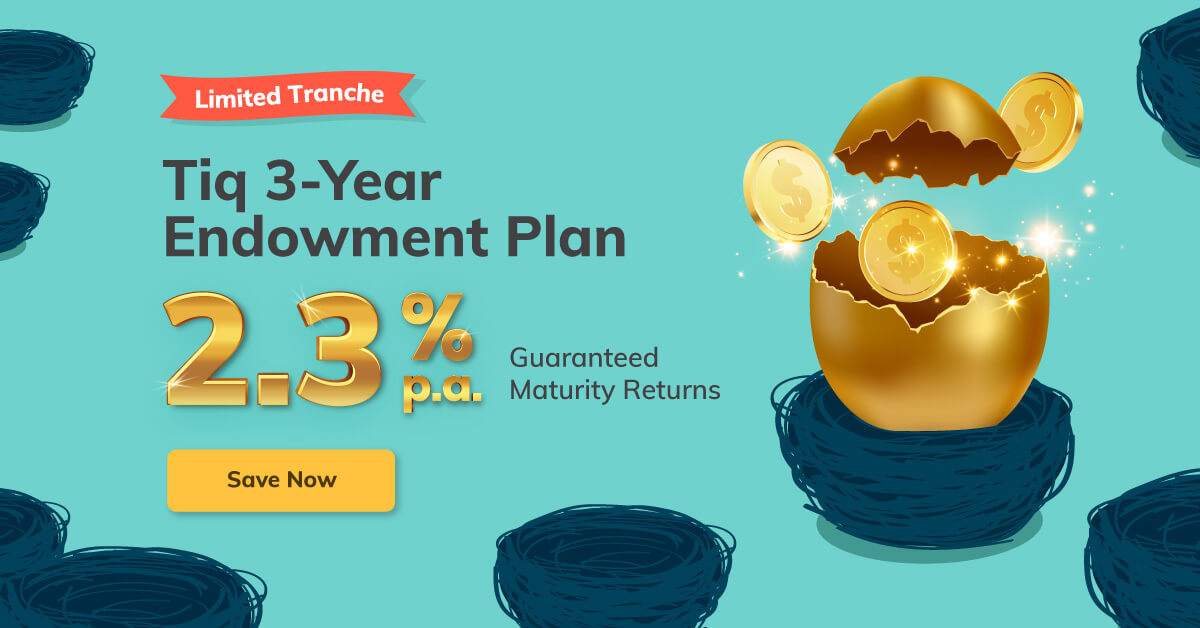A recent study found that two in three working Singaporeans do not have enough savings to last them beyond six months. If you fall into this majority and looking at your bank account balance makes you feel depressed, you might start to question if it is ever too late for you to start saving.
The good news is, it is never too late to start your journey to financial freedom.
When is the best time to start saving?
If you are a twenty-something year old who entered the workforce not too long ago, this is the best time to start saving. Because of compound interest, when you start saving outweighs how much you save.
How compound interest works essentially, is allowing your money to grow by continuously re-investing your returns to earn interest on interest. Its magic is especially apparent if you’re saving up for a long-term goal, such as retirement.
Starting early gives you the advantage of time (and also more time for your money and interest to snowball), and also means that you can fork out less in your later years. If you are still on the fence, here are five reasons why you should start saving for your retirement now.
But what if you’re well into adulting and your 20s are nothing but a hazy memory? Not all is lost. You can still meet your retirement goals if you start saving now, just be prepared to put in more effort and capital.
#TiqOurWord Not sure if it is a good time to save in this economic climate? Find out how you can maximise your savings during this pandemic.
How can I start saving?
Before you can grow your wealth, you need to create it. Here’s how you can do so by focusing on three steps: earn, save and invest.
1. Earn
How much you earn determines the amount that you can save. While you can always cut your expenses to save more, that is usually a short-term solution that isn’t sustainable in the long run.
A better, long-term solution is to increase your earnings and diversify your income streams. With the pandemic throwing the economy into disarray, it’s not a bad idea to consider other forms of side income.
This could be renting out your property for passive income, starting your own home-based business, or even being a part-time delivery driver. The extra income from your side hustles can then be used to cover your expenses, which in turn frees up your main source of income for saving and investing.
2. Save
While there are many ways to gain financial freedom, you’ll be hard pressed to find one where early and frequent savings isn’t a key component. Ultimately, how much you save determines the amount of capital you have to feed your investments.
Always make sure you save before you invest. If there’s anything COVID-19 taught us, it is that life can change in a split second. When that happens, your savings are a safety net that prevents you from falling into a pit of financial insecurity.
The general rule of thumb is to have enough savings to cover at least three to six months of your expenses. Because you might need to tap on this emergency fund urgently, you should ensure that your savings are parked in a safe environment that is liquid.
This includes low-risk options such as bank deposit accounts and even flexible insurance savings plans such as GIGANTIQ and DashEasy Earn that allow you to withdraw your money at any time without restrictions.
What if you are saving for a short-term goal, such as your own flat once you hit 35 in a few years’ time or an epic grad trip in two years? Such goals, which require a large outlay of cash in five years or less, should always be savings-driven rather than investment-driven.
With the volatility of investment tools such stocks, it is much easier to lose your capital and harder to recover it within a short time frame. On the other hand, saving instruments such as endowment plans provide a safe and stable environment for your money to grow while offering protection at the same time.
For instance, the Tiq 3-Year Endowment Plan offers guaranteed returns of 2.3% p.a. at maturity, and – as its name suggests – features a short 3 year policy term that would please all commitment phobias while helping you to achieve your short term goals. This means you will receive 107.1%^ of your single premium at the end of 3 years.
In addition, it offers a death benefit of 101% on the single premium and features guaranteed acceptance regardless of your health condition.
Even if you are not saving up for a specific goal, the guaranteed benefits of the Tiq 3-Year Endowment Plan allows you to hedge against the recession and gives the freedom to channel your cash into investments once the economy recovers.
#TiqOurWord Fastest fingers first: the Tiq 3-Year Endowment Plan is a limited tranche product brought back by popular demand. Click here to apply today.
3. Invest
After you have saved for your rainy days and short-term goals, funnel any excess funds into investments.
Investing and saving are fundamentally quite different, even though both encompass putting money away. Investing is an inherently riskier approach to growing your money, but also offers potentially higher returns through investment tools such as stocks, bonds and real estate among others.
A good financial plan would always include a good mix of savings and investments – the former as a safe way to hedge against inflation and volatility, and the latter as a way to tap on the power of compounding.
If you have saved most of your cash but would still like to invest, consider investing your CPF savings through the CPF Investment Scheme (CPFIS). The scheme is aimed at helping you enhance your retirement egg and allows you to invest your CPF savings in a variety of products including shares, unit trusts and ETFs.
Alternatively, the Supplementary Retirement Scheme (SRS) can also be used to help you save more for your retirement by offering tax incentives on your investments, such as tax-free investment returns.
How can I save better?
Now that you have decided to start saving for your retirement, forget about any regrets of not starting earlier and focus on taking action. Here are some tips on how to get started.
- Be realistic
Sit yourself down and evaluate your income versus your ideal retirement. If you do not have enough, you may have to relook your goals, cut your expenses, or boost your earnings track your expenses.
- Set your budget
Figure out how much you need for retirement and work backwards to decide how much you need to save each month. If you are falling short, try cutting your expenses using these money management tips and online shopping hacks.
- Pay yourself first
This doesn’t mean treating yourself to the latest gadgets, but prioritising saving for your future. Set up automatic transfers into a savings account or consider insurance savings plans to force yourself to save on a regular basis.
Don’t be disheartened if you missed your chance to start saving when you were younger. It is never too late to save. After all, saving late is better than not saving at all.
[End]
^The total guaranteed maturity returns (rounded to 1 decimal place) is based on the guaranteed yield at maturity of 2.3% p.a., which will be paid at the end of the 3-year policy term, provided that the insured survives, with no policy alterations or claims made during the entire policy term.
Information is accurate as at 13 July 2022. This policy is underwritten by Etiqa Insurance Pte. Ltd. (Company Reg. No. 201331905K). Protected up to specified limits by SDIC.
GIGANTIQ is not a bank account or a fixed deposit. It is an insurance savings plan that earns a crediting interest rate.
As buying a life insurance policy is a long-term commitment, an early termination of the policy usually involves high costs and the surrender value, if any, that is payable to you may be zero or less than the total premiums paid.
You should seek advice from a financial adviser before deciding to purchase the policy. If you choose not to seek advice, you should consider if the policy is suitable for you. This advertisement has not been reviewed by the Monetary Authority of Singapore.
Tiq by Etiqa Insurance Pte. Ltd.
A digital insurance channel that embraces changes to provide simple and convenient protection, Tiq’s mission is to make insurance transparent and accessible, inspiring you today to be prepared for life’s surprises and inevitabilities, while empowering you to “Live Unlimited” and take control of your tomorrow.
With a shared vision to change the paradigm of insurance and reshape customer experience, Etiqa created the strong foundation for Tiq. Because life never stops changing, Etiqa never stops progressing. A licensed life and general insurance company registered in the Republic of Singapore and regulated by the Monetary Authority of Singapore, Etiqa is governed by the Insurance Act and has been providing insurance solutions since 1961. It is 69% owned by Maybank, Southeast Asia’s fourth largest banking group, with more than 22 million customers in 20 countries; and 31% owned by Ageas, an international insurance group with 33 million customers across 16 countries.
Discover the full range of Tiq online insurance plans here.









